A FIRE SPARKLING IN HOLLYWOOD
Opening a play or musical is always a risk. Plenty of hard work (and sometimes a lot of money) goes into a show, and producers just have to keep their fingers crossed hoping the public will attend. But opening a new theater, especially one which is designed for immersive productions, is a daunting proposition. And can you imagine opening a bar? A truly dicey venture. And opening a restaurant even more so. But to open all of the above in one place on the same weekend? Truly, I couldn’t imagine it working.
Well, situated at the corner of Hollywood and Cosmo, two blocks west of Vine amid a complex of contemporary clubs, is Prospect Theatre. This brand new 150-seat venue is poised to be at the forefront of an experience reminiscent of old-time supper clubs where patrons could spend an entire evening by taking in early evening cocktails and socializing before dining, a show, and more socializing. There was so much hub-bub and ado on opening night (including confusion on just where the entrance of the joint was located) that it was almost too much to take in.
But an attentive staff was terrifically helpful, the food was truly amazing, and some of the hottest performers in town commanded our attention.
With mostly four-tops and a few bench seats, the performing area is designed to be all around you (a.k.a. “immersive theater”). It’s thrilling as actors tower above you, dance between tables, and glide about the room with alacrity. One of the issues for this particular performance, along with body mike problems and some garbled lyrics, is that viewers in the front V.I.P. center sections found themselves twirling around like the tea cups at Disneyland to keep an eye on the action. If just one person were performing, this space would work. But it’s an odd sensation when you’re taking a bite of food and suddenly you’re in the spotlight and an actor is gyrating his hips behind you. After chair shuffling and neck workouts, some patrons gave up and stopped trying to see what was behind them; it does get a bit tiresome. Hopefully, the space will be a black box that can accommodate different performers (expect jazz nights, big band quartets, burlesque, cabaret, etc. in the future).
I would have preferred that the current show, the jukebox musical Romeo + Juliet: Love is a Battlefield, Volume II (which is set to run through August 20, 2016), were in a horseshoe-shaped club, but it was damned good entertainment. Not really trying to tell the doomed lovers’ tale, director/creator Bradley Bredeweg bastardizes 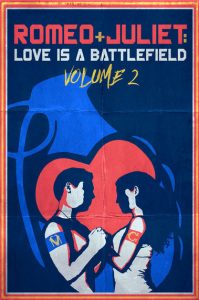 lines and characters from the Bard in order to get to some kick-ass songs from around the 1980s: The feuding families sing Michael Jackson’s “Beat It” to each other; when Romeo (a devastatingly hot Alex Nee) and a female Benvolio (hysterical Jordan Kai Burnett) invade the Capulet Masquerade Ball, they sing Prince’s “1999”; Juliet (sexy, intense Ashley Argota) sings Pat Benatar’s “Heartbreaker” to Romeo just after they first meet; Father Capulet (an authoritative, awesome Peter Allen Vogt) growls Benatar’s “Hell is for Children” to Juliet; Nurse (a very youthful Nicci Claspell) offers Tina Turner’s “What’s Love Got to Do with It” to Juliet; and Mother Montague (a rockin’ Julie Garnyé), who has no lines in Shakespeare, here roars Annie Lennox’s “Walking on Broken Glass” to her son. You get the picture. Some of the cast pushed the rocker thing too far for an intimate space and there was one overwrought performance from a smooth-voiced Jameson Moss as Friar, but you would be hard-pressed to find better voices in all of Los Angeles. (This is a redux of the version which played at Rockwell last year.)
lines and characters from the Bard in order to get to some kick-ass songs from around the 1980s: The feuding families sing Michael Jackson’s “Beat It” to each other; when Romeo (a devastatingly hot Alex Nee) and a female Benvolio (hysterical Jordan Kai Burnett) invade the Capulet Masquerade Ball, they sing Prince’s “1999”; Juliet (sexy, intense Ashley Argota) sings Pat Benatar’s “Heartbreaker” to Romeo just after they first meet; Father Capulet (an authoritative, awesome Peter Allen Vogt) growls Benatar’s “Hell is for Children” to Juliet; Nurse (a very youthful Nicci Claspell) offers Tina Turner’s “What’s Love Got to Do with It” to Juliet; and Mother Montague (a rockin’ Julie Garnyé), who has no lines in Shakespeare, here roars Annie Lennox’s “Walking on Broken Glass” to her son. You get the picture. Some of the cast pushed the rocker thing too far for an intimate space and there was one overwrought performance from a smooth-voiced Jameson Moss as Friar, but you would be hard-pressed to find better voices in all of Los Angeles. (This is a redux of the version which played at Rockwell last year.)
A five-piece band (including cello and superb keyboard playing from music director Brad Hooks), makes the rock aesthetic even more palpable. Misha Reeves’ mostly black costumes — a clash of Emo-style Goth, rocker, street clothes, and Mad Max — were well-suited to the proceedings, and Justin Preston’s mostly red and blue lights were smartly reminiscent of 1980s’ disco clubs.
Most surprising was Executive Chef Kyle Schutte’s inventive sumptuous cuisine. His culinary science began with a starter of Fried Brussels Sprouts, the leaves perfectly chewy with added crunchy rice krispies — a sweet dish with just enough chili spice to set your mouth afire. What a spectacular aftertaste! The Beets Salad with apple-scented goat cheese, vanilla pecans, and compressed apple was surprisingly better than it sounded. Three of the Main Courses were truly remarkable. The OctoPie, an extraordinarily rich vegetarian dish in a green curry béchamel, goes a long way. It almost sounded pretentious, but the large scallops plastered in a creamy corn masa, surrounded by perfectly chewy braised bacon and a palatable gochjang-white chocolate reduction, was one of the most flavorful plates I’ve had in years. But it was the Creekstone Beef Tenderloin — with sides of charred scallion whipped potatoes and carmelized onion demi — that was hands down one of the best cuts in town. Like butter!
Of course, much of the evening’s atmosphere will be hinged on the offered entertainment. For R+J, “sophisticated” and “elegant” don’t spring to mind, but “trendy” sure does. I was simply astounded at how well this opening worked out and look forward to more in the future.
 Prospect Theatre
Prospect Theatre
1643 Cosmo Street in Hollywood
for info and tickets, visit Prospect
Romeo + Juliet: Love is a Battlefield, Volume II
ends on August 20, 2016
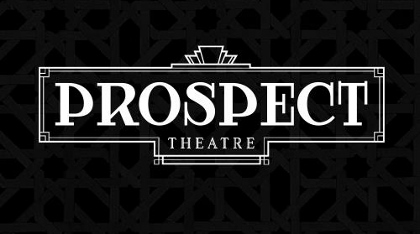

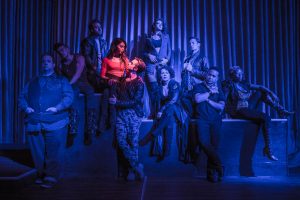
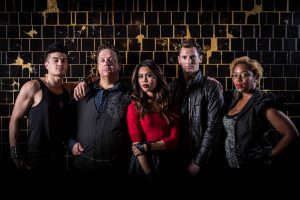
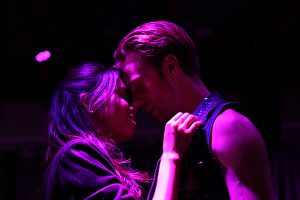
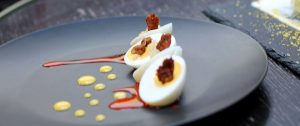
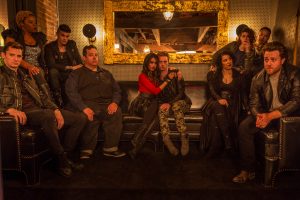
{ 2 comments… read them below or add one }
I think you’re missing the point. I loved how modern and immersive it was and didn’t feel like the show was bastardized anything as I believe their intentions are to tell a modern version of the story in song and dance and I loved every second of it. I thought it was a genius idea beautifully done by cast and crew.
I’m glad you mentioned this, TF. This was in no way meant to be an insult. I’m alerting readers to expect that the point here is mostly about the songs. Some patrons may come expecting all of the real dialogue and characters from the play with songs added. This production had some added dialogue that wasn’t in the play, while other lines and characters from the Bard were deleted or majorly edited. But most of the night was songs, not dialogue. That’s all I meant. “Bastardizes” is not the most accurate word; that implies that characters were lowered in condition or worth. Let’s say “attenuates” or “waters-down” Shakespeare’s dialogue and characters.